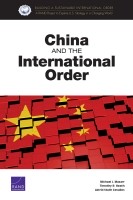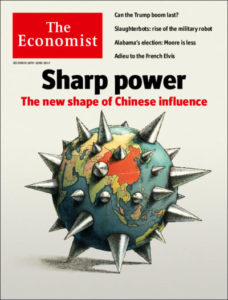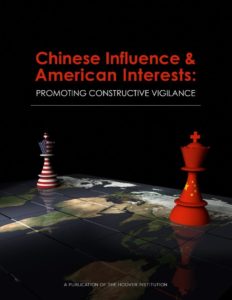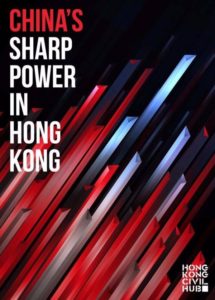
RAND
A new Chinese Communist Party app is helping users catch up with the ruling party’s latest propaganda and ideology with the ease of a swipe on their smartphones, CNN reports:
On Tuesday it became the most downloaded free app in Apple’s app store in China, where it is billed as an “authoritative, accurate, rich and new education resource.” The Chinese-language app was launched on January 1 by Wang Huning, one of the country’s most powerful politicians and a longtime architect of the Communist Party’s ideology…..
You gain “study points” for logging in, browsing, succeeding on quizzes and sharing information, which you can compare with other users. But some online posts have alleged government employees were being forced to raise a certain number of points every day to keep their jobs. It has reportedly been downloaded millions of times across the country.
 It’s become increasingly clear that China is a grave economic, technological and intellectual threat to the United States and the world order, writes New York Times columnist David Brooks. For the past few decades, China has appeared to be a net positive force in world affairs. But a few things have now changed, he observes:
It’s become increasingly clear that China is a grave economic, technological and intellectual threat to the United States and the world order, writes New York Times columnist David Brooks. For the past few decades, China has appeared to be a net positive force in world affairs. But a few things have now changed, he observes:
- First, instead of liberalizing, the Chinese regime has become more aggressive and repressive.
- Second, the Chinese have changed their economic focus so that their economy can directly replace ours. The regime’s “Made in China 2025” policy is an attempt to go up the value chain and dominate high-tech industries like aerospace, robotics and biotech…
- Third, Beijing is trying to seize the controlling centers of the new tech economy. If China can set the standard for 5G communication and dominate artificial intelligence and quantum computing, then it will be able to write the rules and penetrate the fibers of our society and our lives in ways that we cannot match.
- Fourth, the Chinese challenge is no longer just economic; it’s moral and intellectual. It’s a clash of two value systems. And many people around the globe now believe that Beijing’s values are better.
 The ruling Communist Party uses Chinese firms like Huawei as conduits for expanding the regime’s sharp power, observers attest.
The ruling Communist Party uses Chinese firms like Huawei as conduits for expanding the regime’s sharp power, observers attest.
Huawei’s charm offensive dovetailing with broader efforts by China to influence the global debate on the government’s surveillance and censorship it uses, said Shanthi Kalathil, director of the National Endowment for Democracy’s International Forum for Democratic Studies.
“It’s not like an afterthought. That is the foundation of the entire system,” she said.
A new report this week warned of global ideological competition brewing between liberal democracy and authoritarianism, with China as the wealthiest and most powerful potential leader on the authoritarian side.
 Yet competition over standards “does not need to be ideological,” argued “Course Correction: Toward an Effective and Sustainable China Policy”, a report from the Asia Society’s Center on U.S.-China Relations and UC San Diego’s 21st Century China Center.
Yet competition over standards “does not need to be ideological,” argued “Course Correction: Toward an Effective and Sustainable China Policy”, a report from the Asia Society’s Center on U.S.-China Relations and UC San Diego’s 21st Century China Center.
Chinese pay TV company StarTimes is serving up a soft power win for Beijing in Africa, says analyst Angela Lewis. Since it is undoubtedly a state proxy for Beijing, this aiding of African broadcasting is a win for Chinese soft power, she writes for the Diplomat:
China would be better off continuing to deploy more non-state actors, another example being Alibaba Pictures, the Chinese backers of award season smash Green Book (30). While CGTN America’s state-owned status is a turn off, private content partnerships and collaborations are a model of soft power that any average American could warm to – and that people across Africa are already embracing.
 A fascinating essay by Wenfang Tang in American Affairs makes for humbling reading for anybody who thinks we can take the superiority of our system for granted, adds the NYT’s Brooks:
A fascinating essay by Wenfang Tang in American Affairs makes for humbling reading for anybody who thinks we can take the superiority of our system for granted, adds the NYT’s Brooks:
Chinese people have more trust in their governing institutions than Americans do. In a 2008 study, 78 percent of Chinese said their government responds to their needs, compared with 33 percent of Japanese and 21 percent of South Koreans. Chinese society has much more trust and social capital than American society. China, Tang notes, has the second-highest level of social trust in the world, after the Netherlands.
“If we don’t learn to make the case for our system, if we don’t make our system better, a lot of people everywhere will say: I’ll take what they’re having,” notes Brooks.







